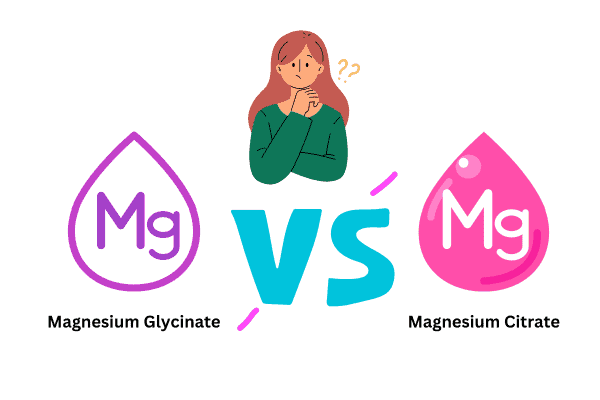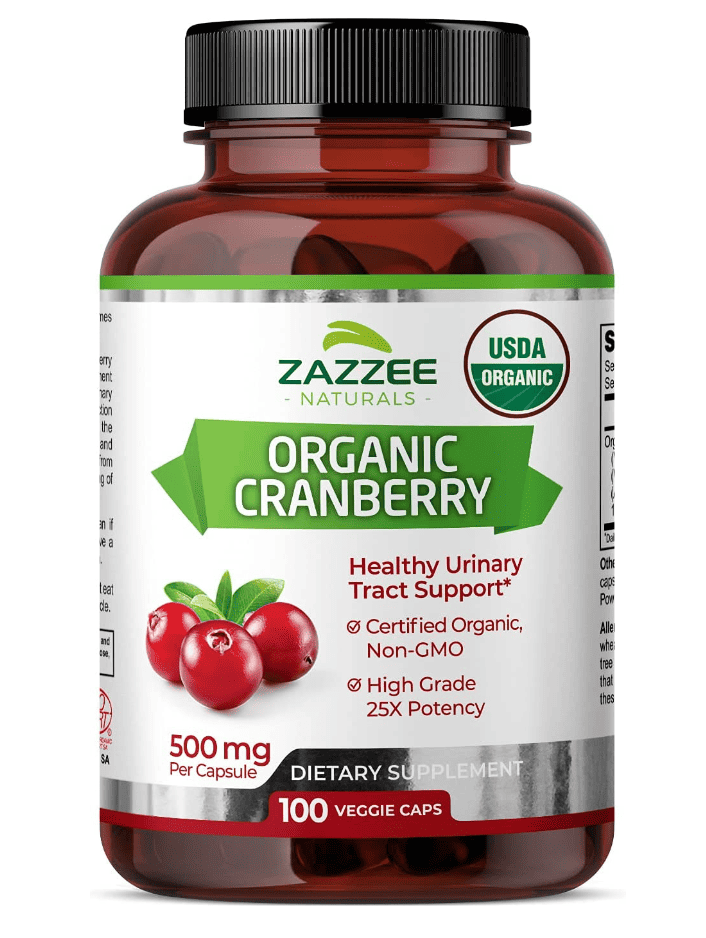Magnesium Glycinate vs Citrate: Which is Better?
Find Your Perfect Match: The Best Magnesium Supplements for You
Magnesium Glycinate vs Citrate; are you puzzled about which form of magnesium supplement, such as glycinate, suits you? Look no further! Magnesium glycinate and magnesium citrate are two popular options for dietary supplements that can support your health in different ways. Understanding the differences between these forms of this critical and essential mineral is crucial for optimal results.
Magnesium bis-glycinate, also known as magnesium glycinate, is an essential mineral dietary supplement that combines magnesium with the amino acid glycine. On the other hand, magnesium citrate contains magnesium combined with citric acid. Both forms come in capsule form for easy consumption.

Why does choosing the proper form of a dietary supplement matter? Magnesium plays a vital role in many enzymatic reactions within our bodies, affecting body health, energy production, muscle function, and more. By selecting the appropriate formulation, you can ensure maximum absorption and utilization of this essential mineral.
So let’s dive into these examples of magnesium supplementation types and discover how each one can contribute to your overall well-being and body health. Magnesium-rich foods and the specific health benefits of this essential mineral are worth exploring.
Understanding the Differences: Magnesium Citrate vs Glycinate
Derived from Different Sources
- Magnesium citrate is derived from citric acid.
- Magnesium glycinate is a combination of magnesium and glycine.
Bioavailability and Absorption Rates
- The two forms of magnesium, a mineral, have different bioavailability and absorption rates. Magnesium oxide and magnesium salt both offer specific health benefits.
- Magnesium citrate, a compound known for its high bioavailability, is easily absorbed by the body. This benefits various bodily functions, including blood circulation, digestive, and heart health.
- On the other hand, magnesium glycinate oxide has lower bioavailability but offers better absorption in the body. This is beneficial for people who want to support their heart health.

Variation in Dosage Recommendations
- Dosage recommendations may vary for each form of magnesium.
- For people, magnesium oxide citrate is recommended at dosages ranging from 200 to 400 mg daily to support the body.
- In contrast, magnesium glycinate oxide may require lower dosages due to its higher absorption rate in the body.
Understanding the differences between magnesium citrate and glycinate is crucial when considering which form to incorporate into your body’s supplement routine. While both offer unique benefits to the body, their sources, bioavailability, absorption rates, and dosage recommendations should be considered.
Magnesium citrate derives from citric acid, while magnesium glycinate combines magnesium with glycine. Magnesium citrate boasts high levels of both. This means that the body can readily absorb it for maximum effectiveness. Conversely, magnesium glycinate has lower bioavailability than its counterpart, but its absorption rate surpasses other forms.
Dosage recommendations may also vary between these two forms of magnesium. A daily intake ranging from 200 to 400 mg is typically suggested for individuals opting for magnesium citrate. However, lower dosages are often recommended for magnesium glycinate due to its enhanced absorption capabilities.
By understanding these differences in composition and functionality between magnesium citrate and glycinate, you can decide which form best suits your needs and goals. Consult a healthcare professional or nutritionist to determine the appropriate dosage and ensure optimal results.
Decoding the Variations: Magnesium Citrate vs Magnesium Glycinate
Molecular Structures and Compositions
- Magnesium citrate and magnesium glycinate come in different forms with distinct molecular structures.
- Citrate form contains magnesium combined with citric acid, while glycinate form combines magnesium with the amino acid glycine.
Additional Ingredients or Additives
- Each supplement type may contain additional ingredients or additives.
- Magnesium citrate supplements commonly include fillers such as cellulose or stearic acid.
- On the other hand, magnesium glycinate supplements often have fewer additives and may suit individuals with sensitivities.
Benefits and Drawbacks
- Magnesium citrate is known for its laxative properties, making it helpful for addressing constipation issues.
- However, taking magnesium supplements, such as chelated magnesium or magnesium sulfate, can have a laxative effect, leading to more frequent bowel movements. This may be inconvenient for some individuals, but it can help treat magnesium deficiency.
- In contrast, magnesium glycinate is less likely to cause digestive changes or discomfort due to its gentle impact on the digestive tract.
Unique Properties Setting Them Apart
- Magnesium citrate primarily targets the intestines and promotes bowel movements by drawing water into the colon.
- Meanwhile, magnesium glycinate replenishes magnesium levels without significantly impacting the digestive system.
By understanding these differences between magnesium citrate and magnesium glycinate supplements, individuals can choose a variety that best suits their preferences and needs. Whether seeking relief from constipation or aiming to support optimal magnesium levels without affecting bowel movements, both types offer unique advantages. It’s essential to consider personal requirements when selecting a suitable option.
The Importance of Choosing the Right Magnesium Supplement
Choosing the right magnesium supplement is crucial for meeting individual needs and goals. Different health conditions or deficiencies may require specific forms of magnesium supplementation. When selecting a supplement, it’s essential to consider potential side effects and interactions. Consulting healthcare professionals can provide personalized advice.
- Individual Needs and Goals: One size doesn’t fit all. Everyone’s requirements vary based on age, gender, lifestyle, and overall health. Determining your magnesium status is vital before choosing a supplement.
- Specific Health Conditions or Deficiencies: Some individuals may have certain health conditions or deficiencies that necessitate a particular magnesium supplement. For example:
- Magnesium glycinate might benefit those with digestive issues due to its gentle effect on the stomach.
- Magnesium citrate may be preferred by individuals looking for a laxative effect or relief from constipation.
- Potential Side Effects and Interactions: While magnesium supplements are generally safe, they can cause side effects in some people. These may include diarrhea, stomach cramps, or nausea. Certain medications or medical conditions can interact with magnesium supplements. It’s important to discuss these possibilities with your healthcare provider.
- Consultation with Healthcare Professionals: To ensure you’re making the right choice regarding magnesium supplementation, consulting healthcare professionals is highly recommended. They can evaluate your needs and advise you on the most suitable form and dosage.
By understanding how individual needs and goals should dictate supplement selection, considering specific health conditions or deficiencies, being aware of potential side effects and interactions, and seeking professional guidance when necessary, you can decide which magnesium supplement is best for you. Remember that maintaining adequate levels of this vital mineral is crucial for overall well-being.
Note: The information provided here is not medical advice; please consult a healthcare professional for personalized recommendations on magnesium supplements, such as magnesium orotate, chelated magnesium, and magnesium bisglycinate.
Comparing Absorption Rates: Magnesium Glycinate vs Citrate
Research-backed information on magnesium glycinate and citrate absorption rates reveals exciting insights. Several factors influence the absorption of these forms, including stomach pH levels. Let’s delve into the notable differences in speed and efficiency between glycinate and citrate while also considering how absorption rates impact effectiveness.
- Absorption Rates: Studies have shown that the body readily absorbs magnesium glycinate and citrate. However, the rate of absorption may vary.
- Stomach pH Levels: The stomach’s acidity determines how efficiently magnesium is absorbed. Glycinate is believed to be less affected by stomach acid, resulting in improved absorption compared to citrate.
- Speed and Efficiency: While both forms are practical, some research suggests that magnesium glycinate may be absorbed slightly faster than citrate. However, individual variations can influence this process.
- Effectiveness Impact: The varying absorption rates can impact how quickly each form affects the body. For instance, if rapid replenishment of magnesium is required due to low blood levels or heart rate irregularities, glycinate might be preferred over citrate.
Understanding the differences in absorption rates between magnesium glycinate and citrate helps individuals make informed decisions based on their needs. It’s important to note that personal experiences may differ due to factors such as overall health, diet, and lifestyle choices.
Evaluating Effectiveness: Magnesium Glycinate vs Citrate
Scientific evidence supports the efficacy claims for both magnesium glycinate and citrate. Each form offers specific health benefits, but it’s important to consider potential limitations and conflicting research findings before deciding. Individual experimentation is encouraged to determine personal effectiveness.

- Magnesium glycinate is known for its calming effects on the body, making it a popular choice for individuals seeking relaxation and stress relief.
- On the other hand, magnesium citrate is often used as a laxative due to its ability to promote bowel movements.
- Both forms of magnesium have been linked to regulating blood sugar levels, which can benefit individuals with subclinical imbalances.
- It’s important to note that while both supplements are generally safe when taken within recommended dosages, they may have different side effects. For instance, some individuals may experience a laxative effect with magnesium citrate, whereas others may not.
Considering these factors, it becomes clear that choosing between magnesium glycinate and citrate depends on individual needs and preferences. Some people may find the calming effect of glycinate more appealing, while others might prioritize the laxative effect of citrate. It’s crucial to consult with a healthcare professional or nutritionist who can provide personalized guidance based on specific health goals.
Concluding Thoughts on Magnesium Glycinate vs. Citrate
In conclusion, Understanding the differences and variations is crucial. Both forms of magnesium have their benefits and considerations.
Magnesium glycinate is known for its high bioavailability, meaning the body quickly absorbs it. This makes it an excellent choice for those with digestive issues or sensitive stomachs. On the other hand, magnesium citrate is often preferred for its ability to promote regular bowel movements, making it beneficial for individuals experiencing occasional constipation.
When selecting a magnesium supplement, it’s essential to consider your specific needs and goals. Magnesium glycinate may be a suitable option if you’re primarily looking to support overall well-being and relaxation. However, magnesium citrate might be more appropriate if you’re seeking relief from occasional constipation or aiming to improve bowel regularity.
Remember that choosing the right magnesium supplement is essential for optimal effectiveness. It’s always recommended to consult with a healthcare professional before starting any new dietary regimen or supplementation.
In summary, magnesium glycinate and citrate have unique advantages depending on individual circumstances. Consider your requirements and consult a healthcare provider to determine which form of magnesium best suits your needs.
So why wait? Take charge of your health today by making an informed decision about the right magnesium supplement!
FAQs
Q: Can I take both magnesium glycinate and citrate together?
A: While there’s generally no harm in taking both forms of magnesium, consulting with a healthcare professional regarding dosage and potential interactions with other medications or supplements is advisable.
Q: Are there any side effects associated with these forms of magnesium?
A: Both magnesium glycinate and citrate are generally safe when taken as directed. However, some individuals may experience mild gastrointestinal discomfort or loose stools when consuming higher doses of either form.
Q: Which form of magnesium is best for sleep support?
A: Magnesium glycinate is often recommended for sleep support due to its calming properties and potential to promote relaxation.
Q: Can magnesium supplements help with muscle cramps?
A: Magnesium supplementation has been associated with reducing the frequency and severity of muscle cramps. Both glycinate and citrate forms can be beneficial in this regard.
Q: Is one form of magnesium better for athletes or active individuals?
A: Athletes and active individuals may benefit from magnesium glycinate and citrate, as they can help support muscle recovery, reduce exercise-induced inflammation, and aid in maintaining electrolyte balance. It’s advisable to consult with a healthcare professional to determine the most suitable option based on specific needs.
Q: How long does it take for these supplements to show results?
A: The time frame for experiencing noticeable effects of magnesium supplements may vary depending on individual factors such as metabolism and overall health. However, many individuals report experiencing positive changes in magnesium levels within a few weeks of consistently using magnesium orotate.
Q: Are there any dietary sources of magnesium that can be considered instead of supplements?
A: Absolutely! Foods rich in magnesium include leafy green vegetables, nuts, seeds, whole grains, legumes, and seafood. Incorporating these into your diet can contribute to meeting your daily magnesium requirements alongside supplementation if needed.
Resources
We’re reader-supported. We may earn an affiliate commission when you buy through links on our site.

Angus Robertson
Hi there! I’m Angus Robertson, a nutritionist and fitness enthusiast. I am passionate about helping people achieve optimal health through balanced nutrition, regular exercise, and mindful living. My blog, “My Fitness Health Journey,” aims to inspire and empower individuals to make positive lifestyle changes for a healthier and happier life.






